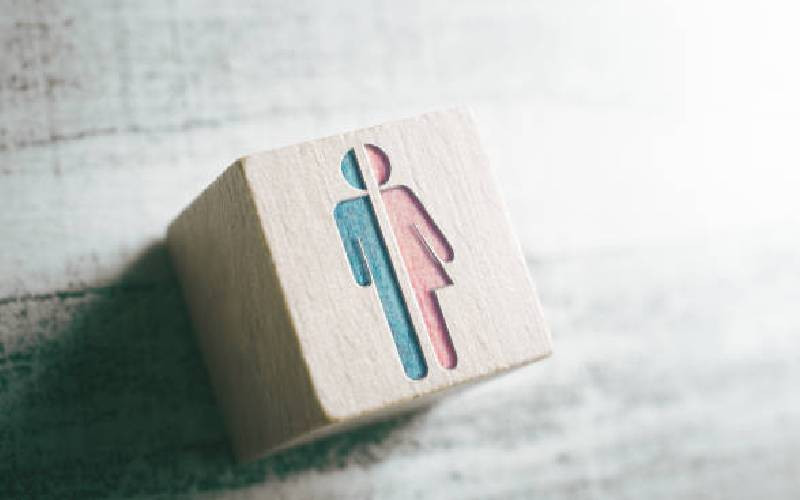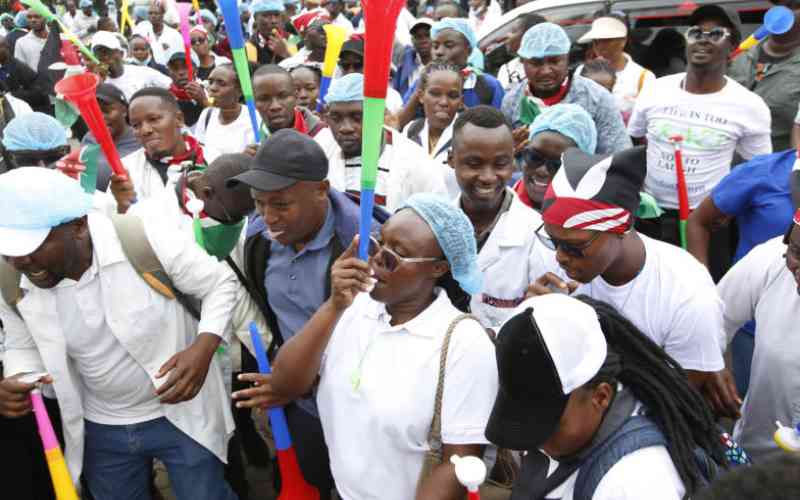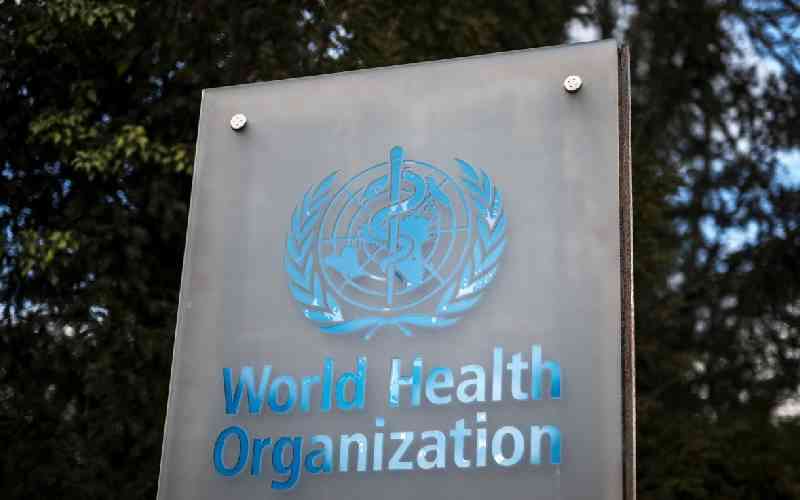
Imagine growing up in a body that does not fit the standard norm of a girl or a boy. You were born with ambiguous genitalia - neither male nor female.
Imagine growing up a girl, then realising, at adolescence, that you do not have a uterus or any reproductive structure that defines a woman.
As your peers animatedly share hearty stories about their first menses and the discomfort that comes with breast 'buds', your chest remains as flat as a pancake, with no signs of spotting.
As their physiques take the feminine outlook, your jawline and chin unabatedly surge. You are just a girl by name and dressing.
The emotional and social anguish.
This was the life of 28-year-old Wendy Mwendwa growing up.
- Support intersex children, parents told
Keep Reading
Clad in a cap, a baggy T-shirt, a high school jacket, a pair of orange pants with side pockets and sturdy timberland shoes, Wendy's trendy look, gait and trait betrays the woman she has considered herself to be.
Growing up in Meru County, Wendy says she started noticing that she was quirky.
"My age mates would start having breasts, starting their periods, and I was just there. My chest was flat like the boys'. I just consoled myself that my time will come," she says.
However, her time never came.
Wendy's breasts did not develop. She never menstruated. Her hips never broadened. When her peers started talking about having boyfriends, all she could do was to try and fit in, by making it happen in her own way.
"They started excluding me, and rumours started spreading that I was not a girl. As an adolescent, I started having feelings. Since I was raised as a girl, my feelings had to be towards boys," she says.
At 13 years, Wendy was defiled by a 23-year-old man, who would later sing about her well-kept secret to the whole village.
According to Wendy, her sexual organs are not fully developed and, hence are differently formed.
"I have the structure of a vulva with no opening, so there's something that looks like a big clitoris or a semi penis. I use that for urinating," says Wendy. This made her first sexual encounter awkward, and, since she was fitting into the social norm, she did not have an option.
"At first, I did not want him but due to peer pressure, I decided to accept his advances. He took me to his house expecting a girl but what he found was different. There was no entrance so he used the only entrance available, anal sex," she says.
After the encounter, Wendy did not tell anyone. She went home and life continued as normal. However, that was not the end of defilement from the man, who continued defiling her while blackmailing her about her biological situation.
As rumours about her went round the village, she developed suicidal thoughts.
"I tried killing myself three times. The most memorable one was when I was in Form 4, during the Kenya Certificate of Secondary Education exams. I sat for some of the papers while admitted to hospital after I tried to take my own life," admits Wendy.
After clearing her examinations, she went back to the man who had introduced her to sex. They lived as husband and wife. However, as she sought refuge, she would end up trapped in her own imagined weakness.
"People talked about me, I would walk and hear murmurs, and others would come and tell me that I had two organs, it broke me. Living with this man was my way of proving to the villagers that I was a woman. I wore dresses, took care of the home, just like a good wife would," narrates Wendy.
She would later leave the man and return to her parents' house. However, home was also not a safe haven for her.
Her father was an abusive alcoholic, hence, she and her siblings were forced to provide for the family.
"My father would come home drunk, and tell me how I had failed in my marriage. He would insult me and sometimes, even beat me up. That torture made me try to take my life the second time."
The father would later chase her out of the house. She rented a house in a nearby shopping centre, but would be forced to go back home to take care of the father, whose alcoholism had hit the skids. Her mother and siblings had abandoned him.In 2019, Wendy decided to stop dressing as a woman and embraced male outfits.
To ease the emotional pain and thoughts that made her feel not good enough, she started abusing alcohol. The temporary numbness sent her deeper into the abyss of addiction.
"My friends became men, I would hang out with them and drink with them. They had no idea what I was going through," she adds.
In 2023, Wendy moved to Nairobi to work at a shoe shop, but would later quit the job and get employed as a female security guard in Nairobi.
"My colleagues for a while have wondered about my gender. Sometimes they would ask uncomfortable questions. I have cried at the work washrooms so many times," she says.
Before she came to Nairobi, she had undergone an ultrasound test that showed she had neither a uterus nor ovaries. She was further advised to go for more tests to determine whether she had undescended testicles.
"I am looking for money to go for that test. At least now, I will have a clear picture of who I am and if there are any interventions that can be done," she states.
Since discovering that she had no uterus nor ovaries, Wendy started dating women. However, that came with its fair share of challenges.
"I live in Mlango (Mlango Kubwa, Mathare)... One day I was walking with my girlfriend and a boda boda man, shouted, "We will burn you and your girlfriend." That comment really scared me, I have been living in fear since then."
Wendy adds that another challenge comes when she has to use public toilets.
"I was raised a girl, and according to my structure, I cannot use a urinal, I have to squat. So when I use the lady's public toilets, people are always astonished when they walk in and see me," she reveals.
Moving from the village was a wise decision for her.
"This is a very tough journey, being like me and reaching 25 years of age is not easy, so many have taken their lives because of stigma. I can only imagine what someone in the village who is like me is going through," she admits.
Wendy is urging the Cabinet Secretary for Gender, Culture, the Arts Heritage, to sensitise the masses on intersex persons.
"The CS should go to villages and look for people like me, counsel them and give them medical interventions if necessary. Because so many are traumatised, living in shame, anger and stigma," she says.
Wendy's biggest fear is not having children.
"I cry a lot. My fear is that when I grow old, who will be beside me? I want to be a parent, I want to have a partner. These are the things that keep me up all night. How will my life end, will I be happy?"
Experts
During the 2019 census, Kenya recorded 1,524 intersex persons. It is believed the number is higher since the intersex conversation is still muted.
According to Dr Saudah Farooqui, an Obstetrician and Gynaecologist, typical male and female sex determination occurs during fetal formation and the main determinant is the Y Chromosome.
"Female is 46 XX while the male foetus is 46 XY. There's a segment on the Y gene called the SRY gene (Sex Determining Region Y gene) which is the primary determinant of male sex development," says Dr Saudah
46 XX, means 46 chromosomes occur and they have a female pattern, 46 XY, meaning 46 chromosomes occur and they have a male pattern.
Dr Saudah adds that when the foetus is developing in the uterus, if there are any hormonal issues, then they can cause an ambiguous genitalia.
Some of the complications may not be detected during the pregnancy until after delivery.
About Wendy's case, Dr Saudah says, further evaluation is needed. If it's chromosomal, there may not be any treatment given. Although there are interventions when detected early.
"We have been able to develop tests that detect congenital adrenal hyperplasia early on. A mother is given steroids to prevent this from affecting the genitalia of the foetus."
Dr Saudah adds that performing a surgery depends on the underlying cause. If they have undescended testis, they have to be addressed because in future it could lead to issues like cancer.
According Paediatric Endocrinologist, Dr Manbere Kahssay, Disorders of Sex Development (DSD) refer to congenital conditions where the development of chromosomal, gonadal, or anatomic sex is atypical. The treatment for a child born with DSD is highly individualised and depends on the specific type of DSD, the health and needs of the child.
"Care is typically provided by a multidisciplinary team that may include, paediatric endocrinologists, surgeons, geneticists, psychologists/psychiatrists and social workers," she says.
Medical managements may include hormone therapy. In cases where hormone levels are abnormal or need to be supplemented, hormone replacement therapy (HRT) may be initiated to help with growth, development, and puberty.
"For example, Corticosteroids in conditions like Congenital Adrenal Hyperplasia (CAH) to replace deficient hormones and manage excessive androgen production as early as diagnosis of the condition," she says.
Dr Manbere adds that testosterone and oestrogen therapy can be used for children who are assigned male or female and require hormone to induce puberty. Such conditions can affect both the child and the parents psychologically.
According to psychologist Jacque Gathu, one of the most damaging things you can do to a child is not make them have a sense of identity. From age 2 onwards, children start identifying with a certain gender, depending on how you dress them and the kind of toys they play with.
"In Wendy's case, she was raised as a girl, and I am pretty sure the care givers could see that they are neither a girl or a boy, but they did not know what to do after that because this is not a topic that is openly discussed. For them, it was easier to just take one gender," says Jacque.
On why Wendy decided to live with the man who defiled her when she was 13 years old, she says one of the most innate needs of a human being is to have a sense of belonging.
"This explains why people are yoked with people who are not good for them because the toxic person is giving them a sense of belonging, they accepted, loved and validated them in whatever toxic way, the psychologist says, adding, "This man saved Wendy from the shame, and whatever stories that were going on in the village. Trauma bonding because at home, I can imagine there was no love and affirmation," says Jacque.
She adds that there are games people play because there are expected results. Getting the wife title was the reward for her and being saved from people talking about her.
When it comes to coping and having romantic relationships, Jacque says being open and vulnerability is the base of a relationship.
To parents with intersex children, Jacque says there's nothing to be ashamed of.
"Accept your child as they are and if parents are financially capable, there are corrective surgeries. As a parent, you have a pre-conceived idea of what child you should have. But do not hide your child, do not be ashamed, as they get older, give them age appropriate information of their genetic makeup, create an atmosphere for them to ask questions," she says.
Ryan Muiruri, Project Manager, Intersex Persons of Kenya, says the Children's Act has a chapter that recognises intersex persons.
"There are other policies that recognise intersex persons, one of them is police standing order. If an intersex person is arrested, they have the right to choose the officer to conduct the search. The government is making efforts in recognising intersex persons," says Ryan.
He adds that they hope Parliament will pass the Intersex Persons Bill, 2024. Since the 2019 census, the intersex conversation has been embraced.
"As we head towards another census, it's high time we engage and ensure this time we have a bigger number. In 2019, there was no awareness, there was stigma, so not many came out. The 1,524, may seem like a small number but to us, it's not. Now we have the number, and no county registered 0, the least was 2 in a county," says Ryan.
Gloria Luhunga, a research assistant at the Kenya National Commission on Human Rights (KNCHR), who is also an intersex person, looks forward to the bill being passed. Gloria, who was raised as a girl, has strong male features.
She is now living as a man, and is in a relationship. However, without the bill being passed, Gloria, cannot formalise the relationship with the girlfriend.
"The other challenge is having children. There are intersex persons with children, but how will they register these children, for example, my name is Gloria, how will I put on the records as my father's name. The bill will unlock that challenge," says Gloria. She adds that dating is among many challenges intersex persons face. "Some people who come to date us, just come to see the structure of the intersex genitals. It's important to brief your partner, who you are and challenges you face," says Gloria.
For Wendy, convincing a cynical society that she, indeed, is intersex is a tall order. Her identity is a cross she carries in her heart, and, like cinder, its pain is stilled in her journey.
 The Standard Group Plc is a multi-media organization with investments in media
platforms spanning newspaper print
operations, television, radio broadcasting, digital and online services. The
Standard Group is recognized as a
leading multi-media house in Kenya with a key influence in matters of national
and international interest.
The Standard Group Plc is a multi-media organization with investments in media
platforms spanning newspaper print
operations, television, radio broadcasting, digital and online services. The
Standard Group is recognized as a
leading multi-media house in Kenya with a key influence in matters of national
and international interest.











